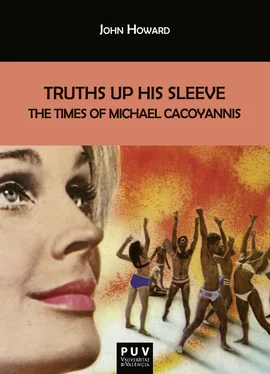Whatever the official title (announcer/translator, programme assistant) Michael was de facto head of the Cyprus Section, overseeing all broadcast content. Though the two-person unit was small, contributors to its programming were legion. With his infectious enthusiasm, Michael recruited any number of notables passing through or based in London, especially cultural and political leaders from the city’s substantial Greek and Greek Cypriot communities. To Michael’s discredit, Turkish Cypriot content never approached their nearly 20% proportion of the island population. Even so, Michael accepted this critique and implemented suggestions for improvement. Also, by supplementing cultural programming with current events and newscasts, Michael could make his contribution to the war effort, without ever enlisting. As a gay man and pacifist, he felt he could not join the British armed forces. 16
Across town at the Colonial Office, another colossal bureaucratic kerfuffle unfolded. Worried about the safety of the Cacoyannis family as prominent defenders of British rule in Cyprus, officials encouraged them to decamp. Destination? Southern Africa. In the increasingly global conflict, the Colonial Office considered the distant imperial outpost of Southern Rhodesia a less likely target of attack than Cyprus. Also, relatives on Michael’s maternal side had lived in sub-Saharan Africa for many years. Whether the Colonial Office had advised or ordered “evacuation,” the Office now seemed obligated to cover travel expenses, since “Sir P. C. is a poor man and cannot be expected to pay without embarrassment.” But would Treasury officials approve? Back and forth went the memos, letters, and secret dispatches. Countless signatures, initials, and stamps were applied, from former cricketers to slightly more meritocratic Oxbridge appointees, as the family and a few other loyalists headed south. Michael remained in London. In the end, an accounting loophole was agreed between the Colonial Office and Treasury, and the Cacoyannis family’s south African sojourn lasted nearly two years, until 1943. All three of Michael’s siblings eventually enlisted. Sensing an opportunity, Stella joined the Royal Air Force in Cairo and was made “an officer straightaway.” Yannoulla served, and George signed up for the Cyprus Regiment, reaching the rank of Lieutenant. 17
In his first two years at the BBC, Michael earned the trust of his boss John Grenfell Williams, director of the African service, who insisted to others that “Mr. Cacoyannis’s instructions about the programmes must be carried out to the letter.” Michael expanded Cyprus broadcasts from five to fifteen minutes twice weekly, increasing the number and variety of presentations. In spring 1942, for example, Michael paid for a piece by linguist and translator I. Kykkotis on bigoted “Nazi Education,” with songs by Andrea Melandrinos, as well as a segment with archaeologist, grecophile, and Sunday Times movie critic Dilys Powell on “Films and Features.” Michael paid a Greek Cypriot priest for a “Spirit of Easter” message, as well as a Turkish Cypriot writer on “Women at War.” By 1946, Michael wangled a budget increase to support thrice weekly broadcasts, on Wednesday, Friday, and Sunday. Compared to the Greek service, where newscasts constituted nearly half of all programming, Michael’s Cyprus service shook things up, with a refreshing eclectic range of talks, features, music, and poetry, the last exceptionally effective in filling gaps of two minutes or less. A popular interactive component, a regular “Listeners’ Corner” segment invited and answered queries from Cyprus, as Michael adjusted programming in response to suggestions or complaints. Also, with Chrysanthe’s help, Michael turned over the microphone to far more women than the Greek service. To be sure, the war figured in many talks and features. However, Michael’s inventive musical selections minimized military marches and concert hall repertoires in order to maximize time for Greek and Cypriot folk music “specially recorded” in the studio. In addition to “light entertainment,” lengthier presentations included a monthly feature “dramatis[ing] incidents from Cypriot history.” 18
Of Michael’s own sole-authored extant BBC scripts, his most accomplished and complex work is the 15-minute original radio play Nicocreon and Axiothea , rediscovered and analyzed here for the first time. Written in 1944 and broadcast at least twice, this tragedy of classical Cyprus—set in the island’s Greek city-state of Salamis, near modern Famagusta—tackles racism, misogyny, and warfare. Despite the royal title, the play opens and closes with a CHORUS OF WOMEN lamenting “the commands of fate.” Moreover, the tale is told retrospectively through Queen Axiothea’s enslaved attendant Andromache, a forerunner of Michael’s title roles for modern working-class women in films such as Stella and A Girl in Black . With four female characters, two male characters, and the women’s chorus, Nicocreon and Axiothea signals major themes that would reverberate throughout Michael’s career, notably the “the futility and folly of all wars.” As Michael later elaborated, in warfare “there can be no clear-cut victor or defeated [because] everybody suffers…. Evil begets evil and revenge begets revenge” in continuous cycles of destruction. Most forcefully, Nicocreon and Axiothea denounces the sexual assault of women, as it implies the systematic rape of wartime, challenging the very notion of women’s bodies as among the spoils of conquest—thirty years before Susan Brownmiller’s second-wave feminist classic Against Our Will . Additional provocative passages in the four-page 1500-word tragedy denounce patriarchal taboos against interracial marriage (between a “pure” Greek and a Phoenician, or Lebanese) and narrate benevolent maternal filicide in lieu of daughters’ enslavement, followed by the collective suicide of deposed King Nicocreon’s brothers, after their wives first have chosen suicide. Also, 22-year-old playwright Michael aligns himself with a rebellious skeptic, the “queer” philosopher Anaxarchus, who dies a noble death, defying “tyrant” Nicocreon. Sentenced to execution by torture, he is pounded to death in a large mortar, in a process known as braying, akin to grinding grain between stones. Refusing to recant, Anaxarchus succumbs with these searing last words: “Bray the shell of Anaxarchus, himself you cannot bray.” “End[ing] in a holocaust” to the strains of Beethoven’s Piano Sonata No. 8 in C minor, or Pathétique, Michael’s radio play is dark, deeply disturbing, and path-breaking. 19
Of course, some Cyprus Section segments went down like lead zeppelins, especially elite offerings amongst the predominantly working-class Cypriot listenership. “The Strange Customs of the Inns of Court” by Chrysanthe’s cousin Lefkos appealed to few, comic sketch “The Opera Singer Explains” by Michael’s sister Yannoulla perhaps a few more, since it lampooned pretense. BBC colleagues grumbled about nepotism, but their unexamined sexism and homophobia may have aggravated matters. Overall, by the end of the 1940s, Michael and Chrysanthe had created an impressive track record of innovative broadcasting in English, Greek, and Turkish languages and Cypriot dialects, from the popular to the highbrow. In his nearly ten years’ service to the Beeb, Michael championed the best authors, artists, and musicians he could find, while remaining attentive to the wartime and postwar anxieties of the island populace. Carving out time for his own writing, Michael also coached countless voice actors, as well as unpaid amateurs—one of whom remembered her sole line seven decades later: “Please, don’t push!” 20
If penning and performing in radio plays gave Michael immense satisfaction, directing and acting in stage plays proved even more alluring. With his extensive experience of broadcast production and his deep immersion in the underground and mainstream London arts scenes, he now was ready to tread the boards himself and direct even larger companies of actors.
Читать дальше











